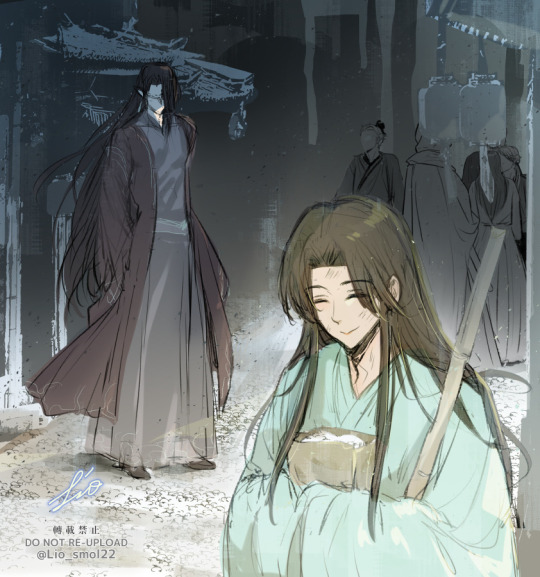Danmei sideblog! For now just MXTX and a little 2ha, but I plan on getting around to more. Not spoiler-free! Profile picture by the lovely @rosietearz used with permission
Don't wanna be here? Send us removal request.
Text

The only thing I really really want from the new tgcf movie is Mu Qing and Feng Xin looking exactly like Fu Yao and Nan Feng but with their proper hair colors. Everything else of the beautiful experience will just be the cherry’s on top of my glorious love affair.
121 notes
·
View notes
Text

For Pei Ming Week on Twitter. Day 1: Baby
77 notes
·
View notes
Text
Wishing everyone good friends and good health, peace and wealth 🐍🎆 Happy year of the snake!

49 notes
·
View notes
Text

41 notes
·
View notes
Text
注視著你

33 notes
·
View notes
Text

NEW HUALIAN DONGHUA STILLS FROM THE SHORT FILM CHAPTER 2!!!!
CHAPTER 1 will be released online in 2 days but Chapter 2 will premiere at an IRL event from Feb. 12-Feb. 23!!!
396 notes
·
View notes
Text
Shen Qingqiu, pissed off during a peak lord meeting: when I die I want Shang-shidi to lower me into the earth, just so he can let me down one last time
Shang Qinghua: bro c'mon
Yue Qingyuan, abruptly overcome by jealousy so intense that he's on the verge of a qi deviation: but I thought I was the one who let Xiao Jiu down the most...?
1K notes
·
View notes
Text


the immediate aftermath of the demon invasion is so funny when you know all the peak lords are a gaggle of gossipy bitches who were definitely taken advantage of the opportunity to see their almost certainly possessed shixiong. like before secluding himself in the lingxi caves and then coming out just on time for the invasion, the only other peak lord he'd interacted with was yqy, so I feel like what happened was like:
YQY: Qingqiu has been weird ever since his qi deviation :( everyone, well used to YQY's weird attachment to their least favorite shixiong: yeah whatever man MQF: unfortunately I think Zhangmen-shixiong is right. Shen Qingqiu let me do a medical examination of his meridians without hissing at me like a feral cat, something seriously strange has happened to him and I don't just mean Without-A-Cure all the other peak lords, scrambling to find any excuse to visit Qing Jing: oh shit clear my schedule I've got to see this for myself
177 notes
·
View notes
Text

"how did you recognise us" yeah bro i wonder
66 notes
·
View notes
Text

Hualian drawing made for a Twitter challenge by @atthis_pictus 👇🏻
https://twitter.com/atthis_pictus/status/1472998289071083524?t=9B1EZZwJ4Ss5_V7hjm5a9w&s=19
1K notes
·
View notes
Text

TGCF Donghua weibo update with an illustration of Mu Qing for the upcoming short film 🦋
450 notes
·
View notes
Text

Fengqing Wedding Zine would like to wish everyone a Happy Lunar New Year! ❤️ May the generals bless you with love, prosperity and health! Thank you @fawnmisty for the sweet art! 💝
126 notes
·
View notes
Text
Wenren E, reading a book about his future: why would I ever want to know someone carnally?? That doesn't sound like me
Wenren E, meeting the person: Oh! Not "know her carnally", "owe her karmicly"! That makes more sense. Dang, this book really does need an editor
366 notes
·
View notes
Text
I kid you not devil venerable also wants to know is about a 300+ years old overpowered demonic sect leader trying to get a dumb teenage girl to break up with her toxic boyfriend
379 notes
·
View notes
Text










Hualian text post again because I keep finding them ✨
259 notes
·
View notes
Text

For that challenge I guess!!
1K notes
·
View notes
